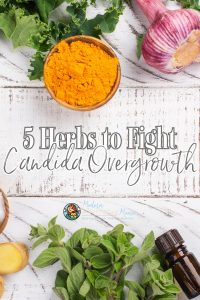By Sarena-Rae Santos, Natural Health Blogger
Many struggle with candida overgrowth, gut health, and potential parasites. If you read our blog, Everything You Need to Know About Candida, you know it’s a common fungus found on and in the body that aids in digestion and nutrient absorption. It is generally harmless, but in many, an overgrowth of candida occurs and becomes problematic.
Common signs of candida overgrowth include (1):
- Chronic fatigue
- Mood disorders
- Recurring vaginal and urinary tract infections
- Oral thrush
- Sinus infections
- Intestinal distress
- Brain fog
- Skin and nail fungal infections
- Hormonal imbalance
Although mainstream solutions exist, such as echinocandin (caspofungin, micafungin, or anidulafungin), fluconazole, amphotericin B, and others, they can be harsh, even harmful. For instance, fluconazole can cause depression and even adrenal gland problems (2). Not to mention, they’re usually not safe for children. Instead, consider common herbs with a long history of fighting yeast naturally, which help bring your gut health back into balance.
5 Anti-Candida Herbs
When looking for the right herbs to manage candida symptoms, it’s important to look for ones with antifungal properties. An antifungal property is when a substance, or in this case, an herb, can fight the growth of specific pathogens that could harm your health, such as ringworm, athlete’s foot, tinea versicolor, toenail fungus, and jock itch (3). Some of my go-to herbs include:
Calendula
Calendula has demonstrated powerful antifungal properties. In studies, calendula essential oil’s antifungal properties have been identified (4). In test-tube studies, the oil from calendula flowers was effective against 23 strains of candida yeast, including common fungi that can cause oral, vaginal, and skin infections (5). Aside from calendula’s antifungal properties, the whole flower is beneficial and has robust antibacterial and anti-inflammatory properties that may help promote gut health (6).
Cinnamon
Cinnamon has antibacterial and antimicrobial properties (7,8), but let’s focus on its antifungal ability. Studies confirm cinnamon’s antifungal effects against Candida albicans and Candida Glabrata (9). Additionally, test-tube studies suggest that cinnamon oil could help kill certain fungi, especially those that cause respiratory tract infections (10).
Remember, there are two common types of cinnamon: cassia and Ceylon. Check out our blog, Cassia Cinnamon Vs. Ceylon Cinnamon, to learn the differences between the two types. Although cassia cinnamon is the most common variety, Ceylon cinnamon is known as the “true” cinnamon (11).
Clove
Clove is an antifungal herb that may reduce stomach ulcers, which can help promote gut health. An animal study found that clove essential oil increased gastric mucus production, protecting the stomach lining (12). Another animal study found clove extract to help treat stomach ulcers while exhibiting similar effects to several anti-ulcer medications (13). These findings have led researchers to believe there could be promising results for humans, but research is limited to animals only.
Additionally, cloves may help promote and improve liver health, which is important when cleansing the body of candida. One animal study found decreased oxidative stress and inflammation and improved liver function in mice with fatty liver disease who were given mixtures containing clove oil or eugenol (14). In another animal study, the eugenol compound found in cloves helped reverse signs of liver cirrhosis or scarring of the liver (15). Although most studies are limited to animal studies, one human study found that taking a eugenol supplement for just one week decreased glutathione-S-transferases (GSTs), a family of enzymes involved in detoxification, often a marker of liver disease (16).
Milk Thistle
Milk thistle isn’t an antifungal herb but has anti-inflammatory properties, which is also important. Thanks to its antioxidant compounds, milk thistle can reduce inflammation, especially from free radical damage. Chronic inflammation has been linked with many diseases, such as type 2 diabetes, asthma, and certain cancers (17). Animal studies demonstrate silymarin’s ability to protect against inflammation in the airways of mice with allergic asthma (18). Another animal study found silymarin helps control asthmatic symptoms by regulating immune responses (19).
Additionally, milk thistle contains a bioflavonoid called silymarin, which helps to support and detox the liver naturally (20). Milk thistle is often used in alternative health by people with liver damage from alcoholic liver disease, non-alcoholic fatty liver disease, hepatitis, liver cancer, and more (21,22,23). Studies have also shown milk thistle supplementation improved liver function in participants with liver disease, showing promise in reducing liver inflammation and damage (24).
Turmeric
Turmeric contains curcuminoids, which are the most commonly studied active constituent in turmeric. Curcuminoids are known for their medicinal properties used in India for thousands of years (25).
In studies, turmeric has been shown to completely inhibit the growth of Candida albicans and many other fungal strains (26). Turmeric’s main compound, curcumin, has liver-protecting and anti-inflammatory properties (27,28). Studies have shown that curcumin matches the effectiveness of some anti-inflammatory drugs without the dangerous side effects (29). Of course, when using turmeric, you’ll want to mix it with black pepper for optimal nutrient absorption, plus it promotes gut health (30).
Now that you know five anti-candida herbs, you may wonder how to incorporate them into your everyday life. My go-to method is homemade herbal extractions. To learn more about making your own herbal extractions, check out our blog, How to Make an Herbal Extraction (With Any Herb).
Additional Candida & Gut Health Resources
If you’re looking for a way to fight yeast and candida overgrowth to restore gut health., consider a pre-made herbal tincture. Candida Cleanse is made with the five herbs mentioned earlier and is safe and effective in bringing the relief you’ve sought.
Some additional candida and gut health resources include:
- Everything You Need to Know About Gut Health
- Everything You Need to Know About Candida
- 5 Tips for Improving Your Toddler’s Gut Health
- 5 Factors that Influence Gut Health
- Earthley’s Downloadable Gut Health Support Guide/Quickstart


